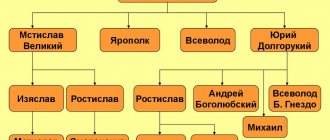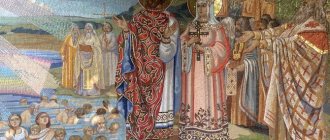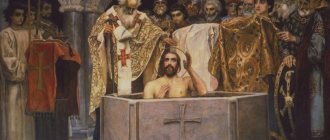- Essays
- On literature
- Other
- Analysis of the Teachings of Vladimir Monomakh
History of creation
Vladimir Monomakh, one of the wisest princes of Kyiv, at the end of his life, decided to write a teaching to his children, in which he formulated the basic rules of human behavior in society. The reason for writing the Instruction was a meeting with his brothers, who suggested that he unite and oppose the Rostislavichs, thereby continuing the strife on Russian soil. Returning home, the prince turned to the Holy Scriptures and decided to write a Teaching to his children.
Genre
The author himself defined his letter as a teaching, but researchers of ancient Russian literature believe that it is more correct to call the work a message.
Plot and theme
Prince Vladimir Monomakh immediately decided on the addressee of his Teaching - these were his children. To them the prince intends to outline the rules of conduct for an Orthodox person, talk about his life path and convey his experience of the eventful princely life. The work is interesting not only for the rules of a virtuous life, but also for how the prince himself is guided by these rules in his life.
Main characters
First of all, this is Prince Vladimir Monomakh himself. The Instruction also mentions the names of Russian princes with whom he had to deal one way or another. Particularly highlighted is Prince Oleg Svyatoslavovich of Chernigov, a longtime accomplice of the Polovtsy and rival of Vladimir Monomakh.
Composition
The lesson consists of three parts. The first part is the rules of life that the prince formulated for his children. The basis of the behavior of an Orthodox person is reverence for God. Daily prayers and good deeds, even small ones. Remembering that we are all not without sins and trying to commit them less is a very important rule for a believer. The prince devoted a special place in his Teaching to the attitude towards the poor. Not to forget them, to constantly take care of them is both a princely and human duty. The prince also reminds his children of the simplest human qualities necessary for a decent person. This is the eradication of laziness, hard work, caring for elders, being honest and not gluttonous, and many others that are relevant in our time.
The second part of the Teaching is the prince’s story about his military activities, which can be called his autobiography. The prince made eighty-three large campaigns, most of which he devoted to the fight against the Polovtsians. The prince, on the orders of his father, made his first campaign at the age of thirteen. In addition to military affairs, the prince writes that his favorite pastime was hunting, which also required physical strength and skill. It was not difficult for the prince to go out alone to both the boar and the bear.
The third part of the Teaching is a letter to Prince Oleg Svyatoslavich of Chernigov, who, in the struggle for power, killed the youngest son of Vladimir Monomakh. For the first time in ancient Russian literature we see an example when the winner writes a letter to the vanquished, in which he forgives the prince for the murder of his son. The meaning of the letter is the prince’s desire to reconcile; he invites Oleg Svyatoslavich, his cousin, to repent and send the wife of the murdered man as a sign of reconciliation. The letter contains numerous references to saints and references to Holy Scripture, which should have an effect on Prince Oleg. The letter to the prince becomes for the children of Vladimir Monomakh a concrete example of following the rules of a virtuous life that he outlined in the first part.
Introduction
When we encounter the literature of Ancient Rus', we are always surprised by every work that came from the pens of our ancestors. Literary scholars give their own explanation to any of these works, each interpreting in their own way the origins of this or that work, the historical and literary prerequisites for its creation, and the social situation that influenced the author. But each of the works of Ancient Rus' surprises with the individuality of its style and its difference from other works of that era. The main common feature in the bulk of Russian literature of the ancient period is that “it placed man at the center of its quest, it serves him, sympathizes with him, portrays him, reflects national traits in him, seeks ideals in him.” [1]
One of such works is the “Teaching” of Vladimir Monomakh, which is a kind of collection of his works: this is the “Teaching” itself, an autobiography and a letter to Prince Oleg Svyatoslavich. The prayer at the end of this collection of works, which is attributed to Monomakh, apparently does not belong to him. [2]
The teaching of Vladimir Monomakh deservedly occupies a very honorable place among the monuments of the confessional, autobiographical genre of classical Russian literature. The work owes its fame primarily to the high and personal merits of its author - an outstanding, legendary figure in the history of Rus', as well as the uniqueness of the monument, which was preserved in the only handwritten copy of the parchment chronicle of the scribe Laurentius, dated 1377.
An important feature of Monomakh’s “Teaching” is its humanistic orientation, its appeal to Man, his spiritual world, which is closely related to the humanistic nature of the author’s worldview. Moreover, protected 100 percent as a reliable handwritten literary source, the “Instruction” in its content is highly patriotic and highly biased towards the fate of the Russian land as a whole and each person individually - be it a prince, a clergyman or any layman. In addition, the “Instruction” is firmly inscribed in the pan-European medieval literary tradition of royal and imperial instructions to heirs and descendants - English and French, Byzantine.
Brief historical background
A boy was born into the family of his father, Vsevolod, and his mother, the daughter of the Byzantine Emperor Constantine Monomakh, whose name was inherited by a descendant. He was revered for his military services with the goal of uniting the Russian land.
The representative of the princely family grew up in an unstable political situation and internal internecine conflicts, and survived military strife with the Cumans, who posed a serious danger. The main event of his reign was the Lyubech congress of 6 Russian principalities on the issue of dividing the territory and unifying the army.
By nature, the prince was a very peace-loving person; he renounced the throne in favor of his brother, which indicates the pacification of his pride. In those conditions, conflicts for the throne usually occurred, which weakened the state. The desire of other representatives of the princely family of power undermined the foundations of the state and welfare of Rus'.
The main thing for the prince was faith in God, which formed the rules of behavior:
- keep promises;
- help the poor;
- respect elders;
- adhere to the right lifestyle and pray.
The best article for you, go to: The word luck in Orthodoxy
He opposed internecine wars and had a negative attitude towards the death penalty, took part in more than 82 campaigns and concluded dozens of agreements.
During his reign, he built several churches, erected stone walls around Kyiv, and laid a bridge across the Dnieper River. He wrote spiritual instructions to his heirs, left moral teachings for them, giving examples of his personal life. His main merit was the unification of lands and protection from Polovtsian raids.
“ The Tale of Bygone Years ” can be considered a work of transition from spiritual to secular literature. The first secular ancient Russian writer is Prince Vladimir Monomakh, who wrote a wonderful “Instruction” for his children [see. its full text and summary].
Vladimir Monomakh's teaching to children. Summary. Listen to audiobook
Vladimir Monomakh, grandson of Yaroslav the Wise, was Grand Duke of Kyiv from 1113 to 1125. In his face we see the ideal image of an ancient Russian Christian prince. Among his princely relatives, Vladimir Monomakh played the role of peacemaker; he took the initiative of the Lyubech Congress, at which the princes kissed the cross, promising to end the discord (“which”). But few of the princes then kept their word; we know that some of the “brothers” sent ambassadors to Vladimir, persuading him, along with them, to rebel against the Smolensk princes (Rostislavichs) in order to drive them out of their volost.
It was after this visit to the ambassadors, to whom Vladimir replied that he could not “transgress the cross,” that is, break the kiss of the cross, upset by the treachery of his “brotherhood,” Monomakh takes the Psalter, seeking consolation in reading the psalms, and, opening the book at random, reads a verse from Psalm 42 - “How sad are you, my soul? How are you confusing me?” Reading this psalm gave Vladimir Monomakh the idea to write his “Teaching”.
Vladimir says that he writes his teaching “while sitting on a sleigh” - “on a distant path.” These words of his can be explained in two ways. In those days, it was the custom to take the body of the deceased to the cemetery on a sleigh at all times of the year, so the phrase “sitting on a sleigh” can be understood as the expression - at the door of the coffin, that is, before death itself. But one can also think that Monomakh, when he wrote his “Teaching,” was really on the road, going somewhere.
The entire “Teaching” is imbued with a religious spirit. Vladimir takes a deep and serious look at a person’s religious duties. He himself is a secular man, a prince, but in his views he approaches the monastic ascetics. He talks to his children about attending church services every day, about prayer - unceasing prayer.
Monomakh considers prayer the most important thing in life; he tells his sons that even on a campaign, sitting on horses, you need to pray; If you don’t know any prayers by heart, then at least repeat to yourself: “Lord have mercy!” Everyone knows this prayer: “even if you ride on horses,” and “you don’t know how to say other prayers, but you constantly cry “Lord have mercy” in secret, because the prayer of all is foolish [better] than to think foolishly while riding.”
He goes on to say that there are three virtues that can be used to defeat the devil: repentance, tears and almsgiving. “Then, my children, God’s commandment is not burdensome; by these three deeds you can overcome your sins and not lose your kingdom. And when dividing (for the sake of) God, do not be lazy, I pray you, do not forget those three things.”
Speaking about the duties of a ruler, Monomakh paints for children an ideal image of a Christian prince, like he himself was. The prince must constantly and selflessly take care of the people entrusted to him, treating everyone equally with justice and mercy, regardless of differences in condition. Both in peacetime and during war, on a campaign, the prince must delve into everything himself, without relying on anyone from the squad, and look after everything himself.
The duty of a prince is to be, as it were, the first servant of his country, his people. - “When you go to war, don’t be lazy, don’t look (that is, don’t rely) on the governor.” - “And dress up the watchmen yourself, and howl from everywhere at night, and get up early, and don’t take off your weapons.”
Monomakh certainly has a negative attitude towards the death penalty: “do not kill either right or wrong, or order him to be killed; Even if he is guilty of death, do not destroy any peasant’s soul.”
He advises receiving foreigners kindly and warmly: they will spread good news to foreign countries. Russian people have always treated foreigners well.
Monomakh says that the prince must get up at sunrise, pray, and attend matins; then he must “think with his squad,” or judge the people who come to him with complaints. After lunch, at noon, you need to rest: “sleep is ordained from God at noon,” - “beasts, birds, and men rest.”
Hunting (“fishing”) is also one of the usual princely activities. At that time, there were still so many wild animals in the forests and steppes that hunting was a matter of protection from their attacks. Monomakh talks about his adventures while hunting: he tells how two tours lifted him up on his horns, a deer trampled him with his feet, the other gored him, a boar tore the sword from his hip, a bear pounced on him and knocked him down along with his horse, but by the grace of God he remained unharmed.
He tells all this not out of boasting, but simply tells his children about his courageous warlike life. This second part of the “Teaching” is autobiographical in nature.
The main task of defending the country at that time was frequent campaigns against the Polovtsy, who roamed the steppes. Monomakh made 83 large campaigns against the Polovtsians alone, but he does not count the small ones.
It is amazing how Vladimir Monomakh combined such a warlike, courageous life, full of dangers and difficulties, with a truly Christian life. The entire Teaching is imbued with the spirit of simple, clear and deep Christian wisdom.
The works of Vladimir Monomakh are part of the Laurentian Chronicle. They include the “Teaching” itself, an autobiography and a letter from Monomakh to Prince Oleg Svyatoslavich. The “Instruction” was the political and moral testament of the prince, addressed not only to his sons, but also to a wide circle of readers.
The author of the “Instructions” appears before us as a highly educated, bookish person, erudite, well versed in the literature of his time, as can be seen from the numerous quotes he gives.
Reasoning 7th grade
This work belongs to the section of ancient Russian literature. Many philologists admit that “The Teachings of Vladimir Monomakh” stands apart in relation to other ancient Russian works.
If we talk about the history of the creation of this work, it will be interesting to know that initially Vladimir Monomakh was credited with the authorship of only one entry from the book and one letter. Now, many scientists do not doubt the idea that the “Instruction” was entirely written by Vladimir Monomakh alone without co-authors.
It is worth noting the exceptional feature of the “Instruction” for that time. The fact is that previously works were written only by persons in the spiritual sphere, since only they were educated enough to write or translate liturgical books. While Vladimir Monomakh is a statesman and public figure, a secular person, a person who was able to use all his strength and power for the benefit of the Motherland.
Already in the beginning of the work one can see sentimental notes. Thanks to them, the testamentary tone of the work is created. Thus, the beginning of the phrase “Sitting on a sleigh...” may hint to an attentive reader about the imminent death of the author of the work. After all, it is known that in the times of Ancient Rus' the body of a dead person was delivered to the burial place on a sleigh. This may indicate that the words of a wise and experienced prince are worth listening to. And it is his great worldly experience that gives him the right to write this “Teaching.” Also, this may indicate that the Grand Duke anticipates his imminent death, so he is in a hurry to leave a kind of will to the princes who follow him.
Because of the words “my children,” one may get the impression that the “Teaching” is addressed to the younger generation. But it is not so. Perhaps, when writing the work, the Grand Duke was thinking about the future generation. But it is worth remembering that at the time the work was written, Vladimir Monomakh was a grand duke. Because of this, his status made him higher in relation to other smaller princes.
In addition, in the “Instruction” one can see a connection with the Bible and other religious books, but this only indicates that the author of this work followed the book traditions of that time.
To make the “Teaching” seem more convincing to the reader, the author allows himself to turn to examples from his life experience. Thus, he gives a long list of campaigns in which he took an active part from the age of 13. And all the examples given only serve as evidence that the Grand Duke not only gives advice about life, but also adheres to it himself. For example, he advised not to abuse power, to be fair, to avoid unnecessary and numerous bloodshed, not to give in to laziness and to serve for the good of your state and people.
Such a conclusion speaks of the real desire of Vladimir Monomakh to leave in the heads of the princes the thoughts of the only correct prince.
Other works: ← What does Andersen's fairy tale The Snow Queen teach? ↑ OtherAnalysis of the novel Nabokov's Defense of Luzhin →
Bibliography
1. Vodovozov N.V. History of ancient Russian literature. - M., 1968.
2. Grushevsky M. Essay on the history of the Kyiv land from the death of Yaroslav to the end of the XIV century. - Kyiv, 1891.
3. Old Russian literature. Portrayal of society. - M., 1991.
4. Eremin I.P. Lectures on ancient Russian literature. - M., 1968.
5. Likhachev D.S. Research on Old Russian Literature. - L., 1986.
6. Monuments of literature of Ancient Rus'. - M., 1978.
7. Pereverzeev V.F. Literature of Ancient Rus'. - M., 1971.
8. Ponyrko N.V. Epistolary heritage of Ancient Rus'. - St. Petersburg, 1992.










